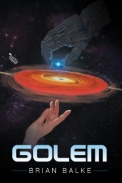
 |
In Jewish mythology, a golem is a mass of mud that can be shaped like clay to do the bidding of its master, without will or conscience. In Brian Balke’s latest sci-fi novel, the principal golem is named Wortrin, a perversely complex construction of electronic and mechanical devices wired to a maniacal brain. Wortrin’s godlike facade has thrown the forces of good and evil into imbalance, and the result could be universal oppression. But Wortrin, as a system, is failing. Corin, denizen of the planet Trialle along with his mother, Queen Zenica, is heading to Paltane to redirect Wortrin’s escalating negative influence. Corin, “the brilliant manifestation of exposure to concentrated spiritual energies” is the mate of Leelay, a very earthly female who possesses powers as yet untested. Corin and Zenica, melding their moral idealism with the strength of intention, may be able to set the universe aright, but even they, with all their abilities, will need to rely on the quiet guiding hand of Yeshua, the avatar and Lord of Creation.
As the sequel to Ma, Golem is, according to the author’s Preface, “a plea for sympathy for our great religious figures.” By setting Corin, whose credo is one of compassion and non-violence, and Zenica, wielder of astral forces through her highly intellectualized feminine sensitivities, upon a worthy quest, Balke is also subtly singing the praises of simple, nature-based existence, exalting female dynamism and casting a stone at cultures (like our own) that are so dependent on technology as to be crippled by it.
Fantasist Balke has a Ph.D in particle physics, so he understands better than most of us the true potentialities of the forces he describes in this paean to our own little piece of green, the planet Earth. Surprisingly, perhaps, for a scientist, Balke gives final and absolute credit to Yeshua, an obvious stand-in for the messianic father of all.
Like its precursor, Ma, Balke’s sequel calls on the reader to think as much as to enjoy. The plot is labyrinthine with new angles, realms and characters arising in nearly every chapter. The tale traverses fantasy realms as well as life on earth, with characters at times utilizing sophisticated virtual meshes, lattices, dimensions, and vibrations beyond our current capabilities, but just as often stuck with primitive boats and pack animals for transportation and swords for defense instead of atomizing beams or laser blades. Alongside Wortrin, whose anatomy is a scientific anomaly, and Zenica with her highly attuned psychic capabilities, there are thanes, warlords, concubines and babies, all quite thoroughly human. Balke pens etheric erotic encounters and adventurous treks through beetle-infested marshes with equal skill and gusto.
Science and religion make for a heady mix in Balke’s latest offering, sure to appeal to astute readers of the fantasy genre and to the author’s already loyal fan base, but at its core, Balke’s innovative fantasy is an exploration of the lofty regions of principle, morality, peace, and inspiration for sentient beings, with a persistent theme being the necessity for the feminizing principle of surrender: “surrender violence, surrender control, and surrender everything but hope.” The overarching message of this ponderous work seems to be that which Balke presents in the Preface, from the wisdom of Catholic philosopher George Santayana: “Those that cannot remember the past are condemned to repeat it.” The book’s denouement strongly hints at a new Eden, with a new man and woman to inhabit the place Yeshua says is “sacred to me.”
RECOMMENDED by the US Review